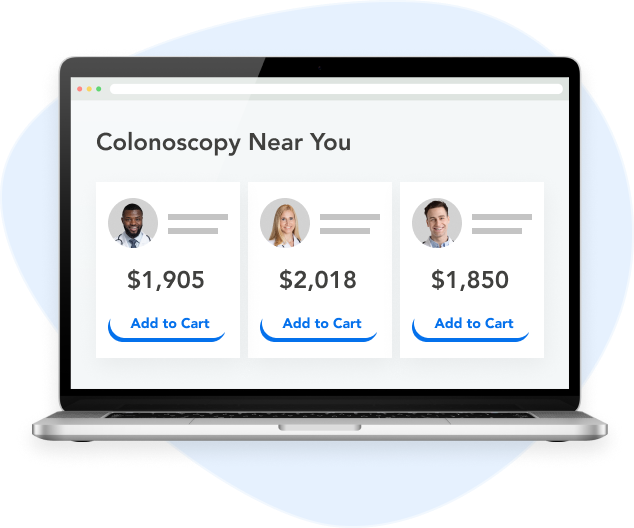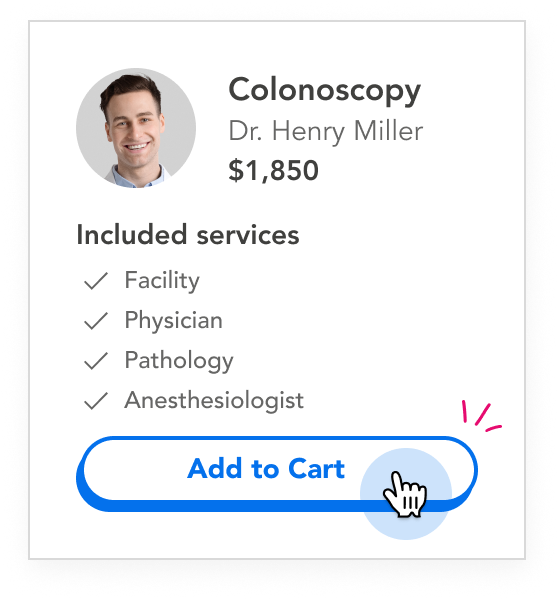
Nuclear Stress Test (Myocardial Perfusion Scan)
(41) Reviews from people who purchased this procedureESTIMATED
NATIONAL AVERAGE
MDSAVE
NATIONAL AVERAGE
This includes a myocardial perfusion SPECT (Single Photon Emission Computed Tomography) test that is used to identify areas of the heart that do not receive enough blood flow. This is done either at rest, during stress (exercise), or both.
How Much Does a Nuclear Stress Test (Myocardial Perfusion Scan) Cost?
Purchase a Nuclear Stress Test (Myocardial Perfusion Scan) today on MDsave. Costs range from $1,043 to $3,398. Those on high deductible health plans or without insurance can save when they buy their procedure upfront through MDsave. Read more about how MDsave works.Find Nuclear Stress Test (Myocardial Perfusion Scan) providers near you
Search board-certified providers, compare prices, buy online, and save money.
What Our Customers Say
Browse 158 Providers in these Locations
Choose your location to find Nuclear Stress Test (Myocardial Perfusion Scan) providers near you.
Shop with
Peace of Mind
Financing options
Promotional financing available when you pay with CareCredit. What is CareCredit?
MONEY BACK GUARANTEE
We will refund your payment in full if you end up not needing your purchased procedure and do not receive care. Details

Procedure Details
What is a Nuclear Stress Test?
A nuclear stress test, also known as myocardial perfusion imaging, is a noninvasive test that measures blood flow through the heart, which can also indicate how well the heart is pumping and areas of the heart muscle that are not receiving adequate blood flow.1
The nuclear stress test begins with an injection of a radioactive tracer, a radioactive dye that is absorbed into the heart cells. Once the dye is absorbed, an imaging machine will take pictures of your heart at rest and after exerting yourself.2
Nuclear stress tests use a very low dose of X-rays, but your radiation exposure is quite low and the test is considered safe for most people. Pregnant or nursing mothers should talk to their doctor before having this test, to avoid risk to the baby.3
What is a Nuclear Stress Test Used for?
- A nuclear stress test can be used to help diagnose, monitor, or guide treatment of heart disease:
- Diagnose coronary artery disease (damage or disease of the blood vessels that carry blood, oxygen and nutrients to the heart)
- Determine proper treatment for existing heart disease
- Monitor treatment effectiveness
- Establish safe levels of exercise
- Determine the cause of symptoms (e.g., chest pain, shortness of breath) that more routine tests have failed to uncover 4
How Should You Prepare for Your Test?
Before your appointment:
- Tell your doctor about all medicines you take, including over-the-counter drugs, herbs, vitamins, and supplements. Do not stop taking any medicine unless advised to do so by your doctor.
- Follow all medical advice regarding what you can eat or drink before your appointment. You may be asked to abstain from caffeine for 24 hours prior to your test.
- 4 - 6 hours before your test, you may be asked to avoid eating and drink only water.
- The day of your test, don’t use oil, lotions, or skin creams.5
Bring to your appointment:
- Loose-fitting clothing
- Comfortable shoes you can exercise in
- Your inhaler, if you use one. Let the clinician administering your test know about your inhaler.6
What Can You Expect During a Nuclear Stress Test?
At the beginning of your appointment, your medical team will confirm your medical history, ask you questions about your exercise habits, and check your heart and lungs.
Before the test begins, a technician will inject the radioactive tracer through an intravenous (IV) line placed in your arm. It may feel chilly when first injected, and will take about 20 - 40 minutes to be absorbed. You’ll be asked to lie flat and still on a table while the clinician takes images of the heart at rest.
The next part of the test is an exercise stress test. Sensors called electrodes will be placed on your chest, legs, and arms, where they will monitor the electrical signals that cause your heartbeats. You’ll have a cuff on your arm to measure your blood pressure, and you may be asked to breathe into a tube. The clinician administering your test will monitor your heartbeats, heart rate and blood pressure while you perform an exercise, usually walking on a treadmill or riding an exercise bike.
When your heart rate peaks or reaches a set rate, you will receive another radioactive tracer. After 20 to 40 minutes to allow it to absorb, more images will be taken of your heart, to see how it functions after exertion.7
What Can You Expect After Your Test?
After the exercise part of your test, you may be asked to stand still for a brief period before lying down. The monitors will remain attached while your heart rate returns to normal. You may need to schedule a follow-up appointment with your doctor to discuss the results.
Unless your doctor tells you otherwise, you should be able to resume your normal routine after the test. Drink plenty of water to help your body will flush the tracer out of your system.8
1,3 American Heart Association, “Myocardial Perfusion Imaging (MPI) Test.” https://www.heart.org/en/health-topics/heart-attack/diagnosing-a-heart-attack/myocardial-perfusion-imaging-mpi-test
2, 4-8 Mayo Clinic, “Nuclear stress test.” https://www.mayoclinic.org/tests-procedures/nuclear-stress-test/about/pac-20385231
Patient Reviews
4.7
What did you like most about using MDsave?
Professional, resourceful and priced competitively.
What could we do to improve?
It would be great if you had more facility's participating around the country.
What did you like most about using MDsave?
Services were free to me.
What could we do to improve?
Please find doctor closer to where employee resides.
What did you like most about using MDsave?
the savings
What could we do to improve?
nothing. very simple and saved me lots of money
What did you like most about using MDsave?
Easy sign up. HUGE savings/
What could we do to improve?
All good!
What did you like most about using MDsave?
Cost Savings for exact same test!
What could we do to improve?
Be sure to include all services (ICD-10) & (CPT) codes
Get Care In Three Easy Steps
Compare Upfront Prices

Search by procedure and location to browse local providers and compare upfront pricing.
Buy Your Procedure

Pay for your procedure online or by calling (844) 256-7696. Or buy your procedure at the facility before your appointment is scheduled.
Receive Your Care

Follow the scheduling instructions given by your provider. Bring your voucher to your appointment.
Procedures
© Copyright 2025 MDsave Incorporated.
All Rights Reserved.
CPT Copyright 2025 American Medical Association.
All Rights Reserved.